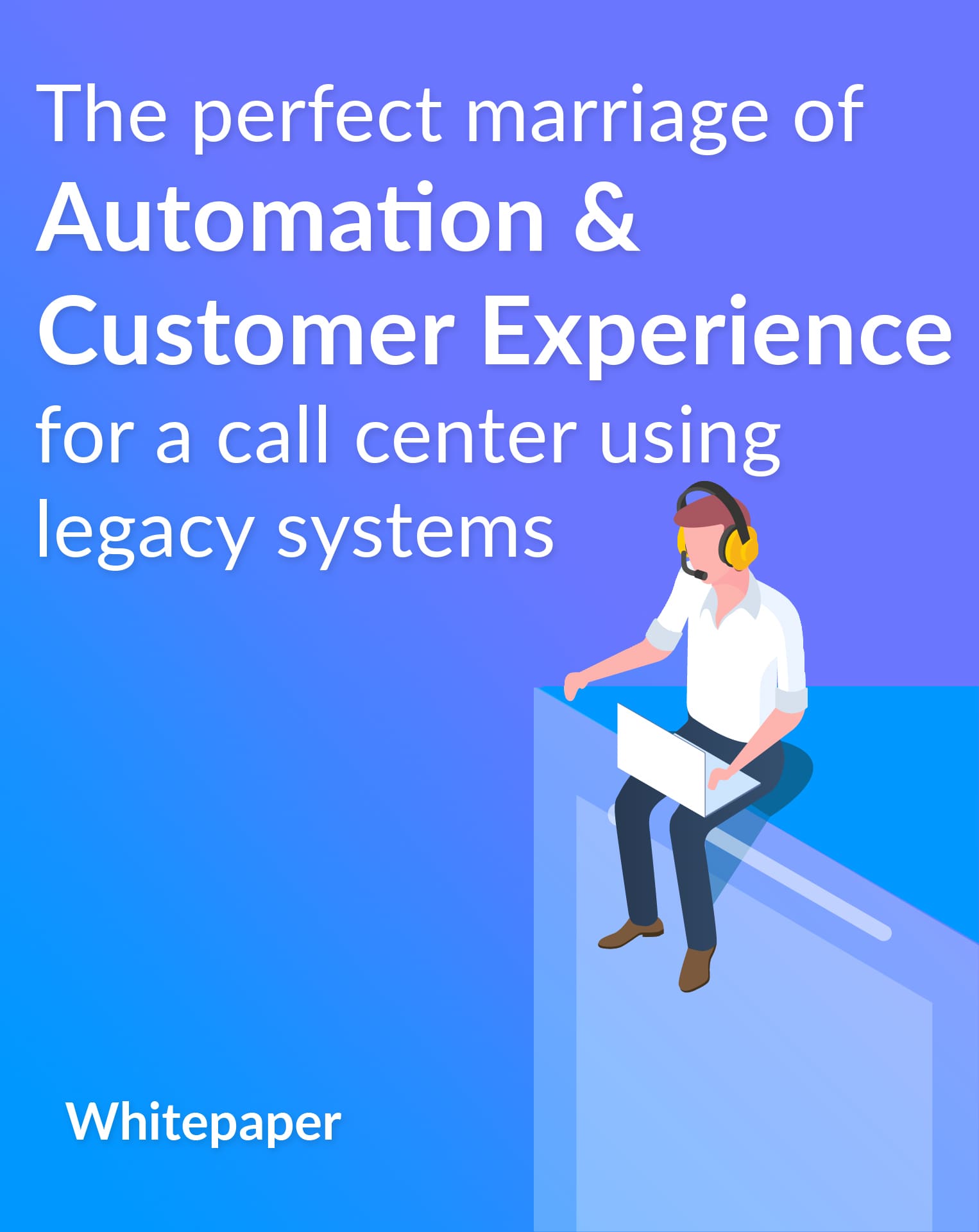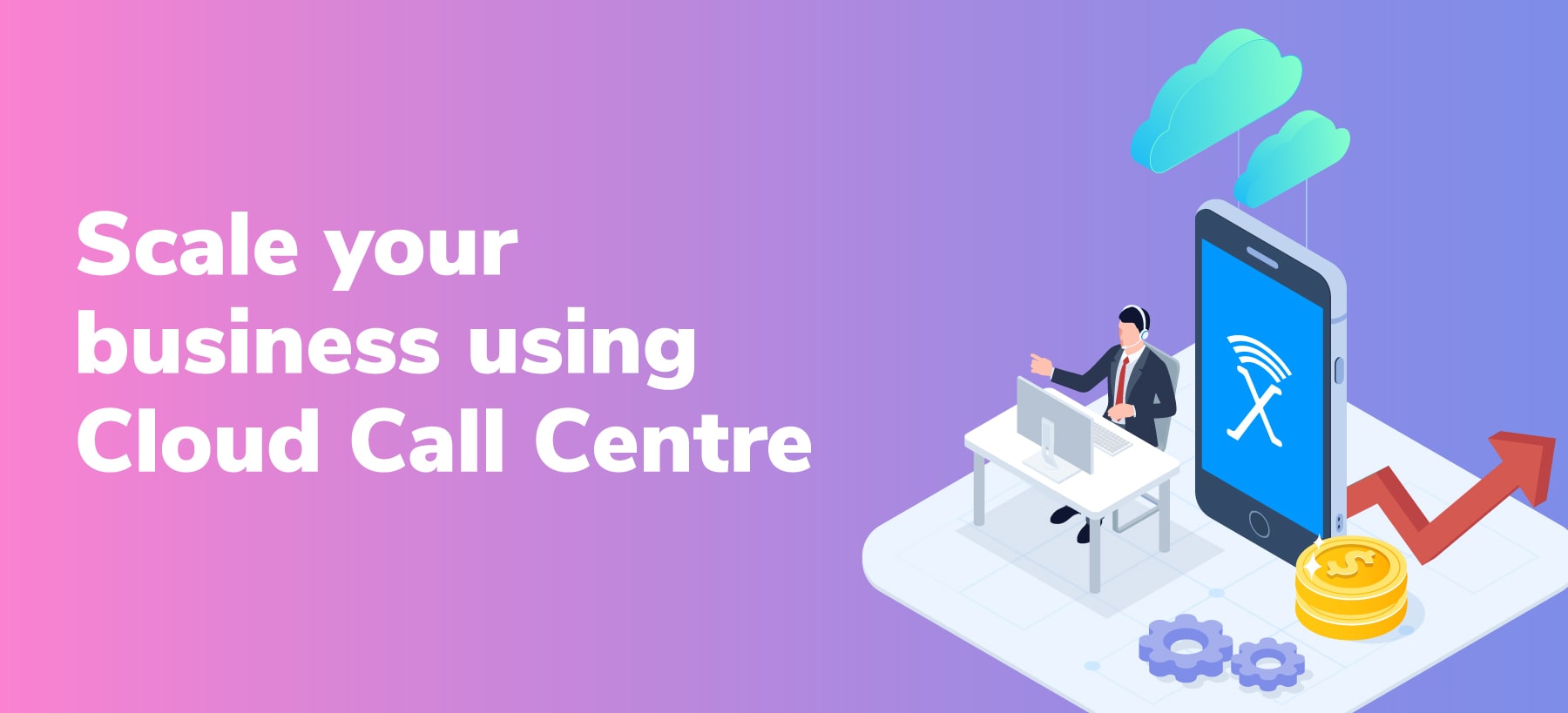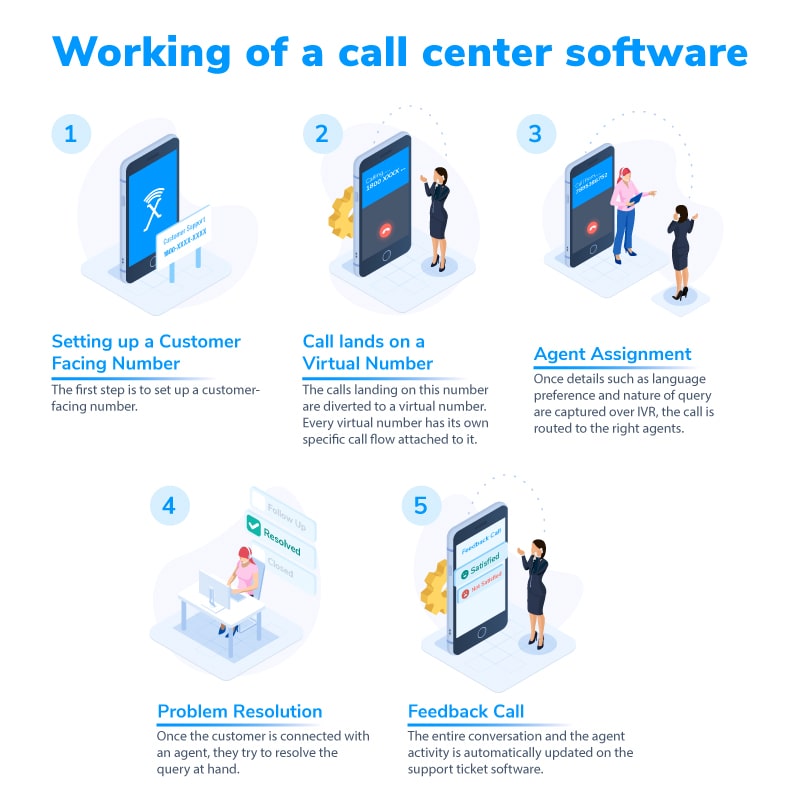(This post was last updated on January 2022.)
Establishing strong communication channels with your customer base is at the core of running a successful business. While the need for call centers is indisputable, choosing the one that fits in with your vision for growth is critical for it to serve its intended purpose. Since all businesses, irrespective of their size, aim to scale operations as quickly as possible, one crucial consideration is to ensure that the call center setup doesn’t become a hurdle in the process.
That’s where cloud call center software has a definitive edge over its on-premise counterpart. To help you make an informed choice, here is everything you need to know about cloud-based call center software.
What is a cloud call centre software?
Call center software that’s hosted on the cloud is a product designed to handle business conversations on the phone without the need for physical hardware and paraphernalia to support communication channels. Using cloud contact center software, your customer support team can handle incoming calls and make outgoing calls. They can also track the key metrics, performance, and use automated scripts for quicker response times.
To achieve this, cloud contact center solutions are equipped with two-way communication functionalities and supporting features such as voicemail, SMS, missed call solutions, delivery tracking, and app to app calling. These software solutions come with easy integration capabilities for e-commerce platforms, CRMs, chat systems, and marketing software solutions. They can also reflect essential metrics, such as a caller’s purchase history, previous phone calls, chat transcripts, notes, ect.
How does a cloud call center software work?
Here’s how an inbound call center software works –
- The first step is to set up a customer-facing number. This is the number customers can call for enquiries.
- The calls landing on this number are diverted to a virtual number. Every virtual number has its own specific call flow attached to it.
- Create a personalised call flow and IVR greeting for enhanced user experience.
- Once details such as language preference and nature of query are captured over IVR, the call is routed to the right agents. In case all agents are busy, the caller remains in a queue.
- Once the customer is connected with an agent, they try to resolve the query at hand.
- The entire conversation and the agent activity is updated on the support ticket software. A query that is resolved is marked as closed. Otherwise, it remains open.
Why should your call centre move to the cloud?
The versatility, flexibility, scalability, and affordability provided lend cloud-based call center software with a certain competitive edge. Cloud-based call center systems afford businesses the benefits of an effective communication channel with minimal expenditure on deployment and implementation. Here, you pay for what you choose, with no extra cost in terms of maintenance and upgrades.
On-premise vs. cloud call centre solutions
On-premises and cloud-based call center software are the two most popular models in use today. Here is a comparison between the two to help you understand the difference:
On-premises call centre
As the name suggests, all the communication paraphernalia – hardware, software, infrastructure – is set up in your office. The communication is facilitated through PBX or IP PBX servers. The organization is solely responsible for installation, upgrade, and maintenance of this setup and all its functions are controlled internally.
Cloud call centre software
Cloud-based call center software, on the other hand, is hosted on the cloud, and users can access this service on their mobiles or computer using an app. This model relies heavily on internet access to offer seamless communication services to its subscribers.
How the two models fare vis-a-vis one another
Set-Up
Setting up an on-premises call center can be a time-intensive process that requires you to buy the hardware, secure licenses, set up infrastructure, and install compatible software.
Setting up cloud call center software is no different than installing an app on your computer. It comes with a plug and play functionality and requires no assembly time whatsoever.
Affordability
On-premises setups come with prohibitively high costs that include the purchase of hardware, licenses, software, as well as investing in additional space to accommodate this elaborate set-up. In addition to this one-time investment, you also have to factor in the cost of regular maintenance and upgrade.
For cloud-based solutions, your only investment is in a reliable internet connection, besides the fixed monthly bill based on usage. This accounts for more frequent recurring costs, but in lower amounts.
Scalability
It is difficult to modulate an existing on-premises call center setup. Any scaling up of operations require additional hardware and possible modifications in the servers and software. In case you need to scale back after a while, you are left with surplus hardware.
Scaling or customizing cloud-based call center software is a hassle-free, seamless process not much different than managing user accounts on your popular video streaming subscription.
Flexibility
Your phone support team needs to be physically present in the office to be able to handle calls on an on-premise setup.
On the other hand, cloud contact center solutions support the arrangement to work remotely. Agents can access the setup and answer calls from anywhere as long as they have a working internet connection.
Reliability
Any breakdowns in the equipment can bring the functioning of an on-premises call center to a grinding halt.
With call center software, you can eliminate the risk of connectivity and call quality problems by merely investing in an internet connection with sufficient bandwidth to support your operations.
Security
Contrary to popular perception, which states that on-site installations are more secure and immune to breaches, an overwhelming majority of data theft and leaks happen on these models.
Cloud service providers need to stay ahead of any possible security risks and threats to survive, and that’s why most operators go above and beyond to make their services secure.
Call centre software for enterprises
Every enterprise needs a customer support department to foster healthy relationships and simplify customer relationship management. Here’s how call center software can be a perfect fit:
Minimal downtime
The PBX models have fulfilled the goal of enterprise-user communication for a long time, but it also comes with higher risks and vulnerability owing to failures, breakdowns, and the ensuing maintenance processes. A cloud-hosted solution, on the other hand, poses no such pitfalls.
With inbound call center software and outbound call center software, you can rest assured of a continued link between you and your customers 99.96% of the time.
Better customer service management
With call center software, you can handle inbound calls in a quick, efficient, and professional manner, even when the volume is high. This is made possible by the software’s ability to route calls based on the niche of the product/services or the nature of the query, allowing the right agents to address the customers’ issues.
All the information exchanged during these interactions is instantaneously updated in the database, facilitating a swift exchange between agents, should the need for it arise.
Disaster recovery
The process of scaling up operations can often be fraught with impending challenges, some of which can bring your operations to a standstill. Even if that happens, cloud-based call center software continues to operate seamlessly as long as you have a working internet connection. This inherent element of disaster recovery helps create a semblance of normalcy even as you focus all your energies into mitigating the lurking obstacle.
Enhanced security
Data security is a significant concern for all organizations today, irrespective of their size, structure, or scale of operations. The near-impenetrable security features of a call center software minimize the risk of losing customer or internal enterprise information due to inadvertent failures or planned breaches.
All the vital data is safely stored in the cloud backup. If need be, the service provider enforces enhanced security protocols at no additional costs whatsoever.
Exotel is helping enterprises seamlessly shift to remote work
Call centre software for small businesses
Cloud-based solutions can offer far-reaching advantages to not just large enterprises, but also businesses of every size and structure. Here’s how:
Affordability
Small businesses often operate on limited budgets, and the minimal set-up cost of cloud-based call solutions is a perfect fit in that milieu. By availing the outbound call center services and inbound call center services of these cloud-based solutions, you only pay for what you use.
In addition to this, you can also scale up or down as you go along without losing precious capital. With detailed subscription plans, there is even greater transparency of costs. You know precisely what communication processes and add-on services you have been charged for, making call center software for small businesses a sensible choice.
Flexible scalability
Upgrades can be tricky for a traditional PBX system. With call center software, however, the process becomes incredibly hassle-free. Once you have started using a cloud-based call center software, you can add or remove features and extensions to suit your business needs.
If you need to scale down your business operations substantially, moving from an office set-up to a remote working arrangement, the same cloud telephony solutions can be used to facilitate remote working for your support staff.
Another clear advantage of using cloud contact center solutions over PBX systems is the clarity in pricing. There is no promise of definitive, clear-defined costs in an on-site call center, as you can never factor in unforeseen repairs, upgrades, and maintenance expenditures. With hosted cloud-based solutions, however, pricing is all laid out for you upfront. Since it is entirely governed by usage, you know the exact cost of running your call center at all times.
Call centre software turned things around for these businesses
Call center software has a clear advantage over the traditional on-premise model. But how do these advantages translate to benefits for your business? The experience of these real businesses will help you make better sense of it:
Scripbox – Reaching more users with a single virtual number
The online investment portal, Scripbox, wanted a single number where customers could reach them and vice-versa. They also needed a system to track and analyze calls. And all of it needed to be done instantly.
With call center software, they were able to replace multiple numbers for different departments with a single virtual phone number. In addition to this, a tracking feature helped them trace missed calls, keep an eye on call quality and analyze the context of conversations. An easy-to-use API facilitates quick, hassle-free integration with their CRM.
Practo – Improving user experience with an integrated calling solution
Since the online health portal’s entire premise rests of phenomenal user experience, they needed a central console to track and assess every aspect of their customer communication on call as well as SMS.
Practo was introduced to the concept of cloud telephony, which was later integrated with their in-house CRM, Epicentre. This helped them to centrally store all their customer data. In addition to this, the complete detail of any conversation between a Practo employee and their customers – complete with call records, date, and time of any previous discussions, a full context of the conversation, and solution offered – are stored centrally.
Vedantu – Delivering personalised learning through cloud telephony
Knowledge network Vedantu is committed to connecting students with teachers to go beyond the one-size-fits-all learning approach and help them learn at their own pace and in their way.
To make sure that the student-teacher interactions continue uninterrupted, Vedantu has leveraged the power of cloud-based call center software. This way, if an ongoing session is interrupted connectivity issues and poor audio quality, the session gets transferred to a voice call routed through call center software.
Call centre software – a tool with vast potential
No matter what your business goals, needs, or limitations are, there is a perfect cloud communication solution that can fit in. Cloud-based solutions are not only cut out to offer customer support experience par excellence but also make the perfect tool cement a customer base by constantly reaching out to them. It offers invaluable insights on customer experience and expectations.
Here’s the full potential that a cloud communication platform offers
Besides, features like automation, IVR can be immensely effective for tracking ROI, recording customer feedback, tracking orders and confirming receipt of payment on CoD orders. And it does all this with minimal manpower and infrastructural requirements, thanks to the evolution of smart tools and platforms aimed at providing cutting-edge CX.

The Perfect Marriage of Automation and Customer Experience for a Call Center Using Legacy Systems
Call automation plays a crucial role in giving right responses to customers at the right time and boosting the overall customer experience. This whitepaper answers the question, “how can I automate my existing systems to boost my customer experience?”






 +91-8088919888
+91-8088919888 +61-2-8073-0559
+61-2-8073-0559 +62-215-098-4960
+62-215-098-4960 +60-3-2771-2799
+60-3-2771-2799 +65-6951-5460
+65-6951-5460